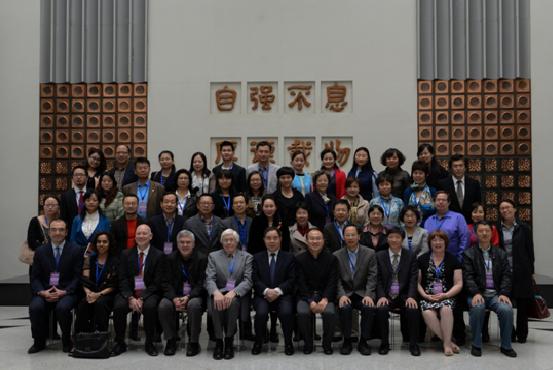The concept of media ethics needs to be redefined in the wake of rapid technological change and global interdependence, a distinguished group of international journalism professors concluded during a three-day conference at Tsinghua.
“Truth telling is the occupational norm of the media profession internationally,” said Clifford G. Christians, an emeritus professor of journalism and media studies at the University of Illinois in the United States.
But Christians,the chief initiator of the Fourth Roundtable on Global Media Ethics, hosted by Tsinghua University from April 19 to 21, added that “both the concept of truth and nature of news must be redefined” to fit the modern world. He called for “an international, non-Western understanding of truth.”
Changing concepts of truth, news and journalism ethics were the main topics of discussion during the roundtable, attended by more than 50 scholars from China and other nations including India, South Africa, Canada and the United States. Participants from Tsinghua University’s School of Journalism and Communication included Dean Liu Binjie, Associate Dean Chen Changfeng, Associate Dean Shi Anbin, Professor GuoZhenzhi, Associate Professor Lu Jia, Lecturer Dai Jia and Rick Dunham, co-director of the Global Business Journalism Program.
Professor Lee Wilkins, chairman of the Department of Communication at Wayne State University-Detroit in the United States, said the conference should seek to define “broad-ranging theoretical principles that can be applied across cases.”
Stephen J.A. Ward, a media ethicist and professor at University of Oregon-Portland’s School of Journalism and Communication, warned that “you can’t regulate a tsunami of new media.”
“Who is going to regulate the citizens … when they are doing things that are unethical?” he asked.
Professor Chen Lidan of Renmin University of China, called for higher standards for Chinese journalists, citing “a lack of awareness of professionalism in journalism” by some in the profession. He decried “paid news” and “checkbook journalism,” as well as the use of “the red envelope” to pay reporters cash to cover events.
Tsinghua Professor Guo talked of “Western ethics in an era of new technology,” and asked pointedly, “Are they relevant in China?” “We have some common universal values,” she said. “And we also have some differences in China.” Professor Guo concluded that internationally accepted ethics standards are important in China. “Western media professionalism seems to be less important in the Western world,” she said. “But in China, we embrace this. In China, we need true reports and objective reports.”
The academics also weighed in on the debate about rumors published in Chinese social media and the government’s attempts to police public discourse.
“Where freedom of the press is limited, fake news might be an attempt – a desperate attempt – to make your voices heard,” said Herman Wasserman, deputy head of the School of Journalism and Media Studies at Rhodes University in Elizabeth Town, South Africa.
The Fourth Roundtable on Global Media Ethics was organized by Tsinghua’s School of Journalism and Communication and the Center for Journalism Studies at Tsinghua. It was co-organized by the Chinese Association of Global Communication and the National Journalism and Communication Discipline Supervisory Committee of the People’s Republic of China. Additional support was offered by the Tsinghua University Initiative Scientific Research Program and the Thinker Workshop.


